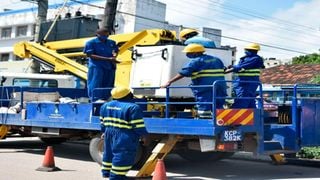
Kenya Power technicians carry out repairs on an electricity line along Haile Selassie Road in Mombasa on December 5, 2020.
Politics
Premium
MPs order to Kenya Power on secret Sh50 billion contracts
A parliamentary committee has directed electricity distributor Kenya Power to make public within 24 hours the contracts it has with 17 independent power producers worth Sh50.22 billion.
The National Assembly’s Public Investments Committee wants Kenya Power to also publish the names of the owners of the companies and how each of them won the tenders.
So secretive are Kenya Power contracts that even the Auditor-General told the committee she has never seen them. MPs said the secrecy is unconstitutional as Kenya Power is a public company and all its undertakings should be made public.
Committee chairman Abdulswamad Nassir (Mvita) said Kenya Power should submit the contracts within 24 hours to the Auditor-General, who will then go through them before the committee has another meeting to examine them.
“There is a lot of secrecy in this process. If the contracts were done through competitive bidding, then they should also be opened for review. If the auditors in charge of auditing Kenya Power have not seen them, then who signed these documents? Mr Nassir asked.
“No one knows how these contracts were drafted. Kenya Power is a public entity funded by public funds and any contract signed in secrecy is illegal.”
Appearing before the committee yesterday, Kenya Power Managing Director Bernard Ngugi told MPs that he would need a court order and consent from the contractors to make the contracts public.
“The power purchase agreements have contractual provisions which would require more time to obtain consent and authorization from court processes because of confidentiality clauses such as Non-Disclosure Agreements (NDA),” Mr Ngugi told the committee.
He also said the government had appointed a task force that is reviewing the contracts.
But MP Paul Katana questioned how Kenya Power got into contracts with companies with a clause that bars them from making the contracts public.
“How did you identify these 17 companies and why did you get into an agreement with companies that would require you to get a court order for you to disclose the contracts yet Kenya Power is a public company? Mr Katana posed.
“Who are the owners of these companies, we want to know in detail whether they are Kenyans or foreigners,” added Baringo Central MP Joshua Kandiye.
On the floor of the House yesterday, Garissa Town MP Aden Duale, who had asked a question to the Ministry of Energy about the directors of the power producers, failed to get any answers, with the ministry saying it needs a court order to reveal the identities of the directors.
“These independent power producers are the ones making power expensive for the common man and they are owned by big people in government and the energy sector,” Mr Duale said.
“We want to know the faces of these people who are stealing from Kenyans. We are going to use our powers to unmask the owners of these companies.”
National Assembly Speaker Justin Muturi directed the Energy Committee to summon all the directors of the companies and the Energy CS to provide more information about the companies.
“This issue of going to court will not happen under my watch. Invite everyone, including the registrar of companies, to come with CR12 of these companies,” Mr Muturi said.
MPs were concerned that Kenya Power is using billions in taxpayer money to buy electricity from the power producers but do not consume the entire consignment.
Mr Ngugi confirmed to the committee that they do not use everything that they buy from the producers, saying the sale of power depends on consumption demand.
Mr Ngugi told MPs that Kenya Power procures power from producers at negotiated prices depending on the plant technologies, generation source and type. He added that the generation type is in various forms based on whether the plant is guaranteed by capacity or energy.
Wajir North MP Abdisalan Ibrahim said an internal audit of Kenya Power is needed to determine the effectiveness of the cost of power.
“We urgently need an internal audit report so that we can know whether electricity costs are realistic and whether Kenyans are getting value for money,” Mr Ibrahim said.




